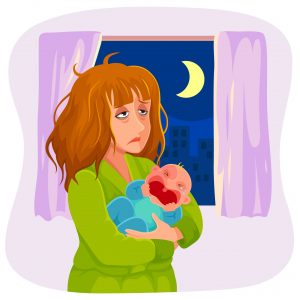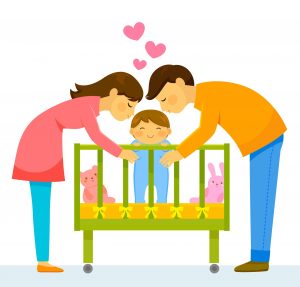Sleep training is cruel. According to Facebook experts all over the Gentle Parenting sites, parents who sleep-train are cold-hearted and neglectful; abusive, even.
I mean, babies are tossed into a cold, dark room, on a cold, hard mattress for heaven's sake. There's nothing gentle about that.
Reading random comments and anti-sleep-training articles on the internet will have you believe that parents who let their children “cry it out” at bedtime are throwing their babies in a cold, dark dungeon, promptly at 7 pm every night just so we can drink wine and laugh at their cries.
Is that really what happens, though?
No. That is a narrative perpetuated by the gentle parenting and attachment parenting communities. It sells books, courses, and baby products.
The Montessori community seems to be pretty much split evenly on this subject. It mostly just comes down to personal interpretation of the research about sleep training and personal preference.

Will sleep training hurt my baby?
As far as research of parenting practices and their long-term effects on children, the “evidence” that the anti- sleep-training crowd uses to justify their (sometimes dangerous) sleeping practices, and to bash sleep-training parents, is not rooted in strong science..
The studies are poorly conducted and the synopses are heavily biased and, for a lover of science, difficult to read.
To say that setting a bedtime, after a long day of bonding and love, can cause lifelong brain damage is a hard stretch.
And there is science is to back me up.
What is sleep training?
Let me paint a more accurate picture for you of what sleep-training really is:
The evening routine commences with a relaxing bath and some soothing lotion, maybe even a little massage to relax those muscles that worked so hard, rolling and crawling all day. Then, parents put some nice, warm pajamas on, taking care to make sure no hair is wrapped around tiny toes.
A favorite book is read. The baby's room is set to a comfortable temperature and the crib is cleared of anything potentially harmful.
The light is turned off, leaving a calm-inducing atmosphere, lit only by a nightlight. Mom might nurse, or either parent might offer a bottle while humming or singing a familiar lullaby.
Then, before the sweet baby is laid in his crib, awake, mom and dad give a gentle kiss and say goodnight. This is where Montessori and sleep training meet; parents have followed the child's sleep cues and povided the comfort the baby needs, as well as the atmosphere.
They may wake up to eat, and, of course, you go in there and feed them. Then you lay them back down, awake. They are again going to be upset, but not as upset as they were at bedtime.
Rinse and repeat, and after a few nights, there will be no tears. Your baby might even smile as you lay them down.
This, now, is their new routine, and they appreciate no deviation from it. Just like with their old routine.
This is sleep training in a nutshell and it is the route many Montessori parents choose, as co-sleeping is not always desired by the parents and/or child and many parents' work situations don't allow for it.

How to make bedtime easy
There is usually some crying involved in sleep training, and that is why it is not considered a Montessori-aligned parenting practice.

There are many ways parents can make sleep learning easier, however. Here are several:
- Follow your child's sleep cue's and lay them down before they are overtired. (rubbing eyes, glassy eyes, yawning, irritablility)
- Keep a solid pre-sleep routine. (bath, massage, pajamas, feeding, book)
- Make sure any post-feeding gas has been worked out of their system.
- Lay your baby down drowsy, but awake, in a comforting atmosphere.
Many sleep experts recommend not feeding immediately before sleep. Here are some other tips:
- Keep days bright and nights dark.
- No screentime immediately before bed.
- Calm, quiet acticities before bed only.
- Allow baby to cluster feed in the evening.
- Avoid overtiredness by ensuring adequate daytime naps.
- Ensure plenty of closeness and bonding happens throughout the day.
Attachment and sleep-training
There is a ton of controversy around encouraging independent sleep, especially in the Attachment Parenting segment of the parenting population. Many muse that sleep training damages the parent-child attachment.
(To clarify, Attachment Theory and Attachment Parenting are two separate things. The Attachment Theory is a valid scientific theory that basically states a secure, healthy attachment to a caregiver in the early years of a child's life is necessary for optimal development. Attachment Parenting is simply an evolution of the Attachment Theory.)
There is no evidence this is true.
Love your baby, comfort your baby, talk to your baby, show them affection throughout the day and secure attachment will happen. They will also come to know that nights are for sleep and that their loving parents will be in when they are needed.
Dr. Montessori's thoughts on sleep
Dr. Montessori had some thoughts on children's sleep habits. She felt that a child should sleep when they want and wake when they please.
During the time she wrote these musings, however, parents were still being told by physicians to keep babies on a strict schedule and to not spoil their children with too much affection.
My own grandmother told me that as a baby, she was picked up and held by the clock, fed by the clock, and put back in her cot by the clock.
It is very likely Dr. Montessori was raging against this particular machine.
But, much time has passed since then and, although some parents do still adhere to schedules for their little ones, they are loose schedules; more like routines. Many of these schedules/routines are based on the cues of the child and the needs of the child.
How much sleep do kids need?
Much research has been done since Dr. Montessori's words were printed. We know a lot more about the sleep needs of children than was known in her time.
Here are the current recommendations on the sleep needs of children ages 0-5:
Newborns (0-3 months)
14-17 hours
Infants (4-11 months)
12-15 hours
Toddlers (1-2 years)
11-14 hours
Preschoolers (3-5 years)
10-13 hours
Sleep training and Montessori
There is much propaganda regarding the cortisol levels of children during sleep training, but elevated cortisol levels are only harmful over an extended period of time, such as chronic sleep deprivation, extended maternal separation, and physical and emotional neglect.
As stated earlier, sleep training typically involves a few new nights of protesting at bedtime, then years of easy bedtimes and restful sleep. Many parents continue nursing their babies when they wake hungry; needs are not ignored.
There is absolutely no evidence that cortisol levels remain elevated beyond the short period of sleep learning.
Also, something you should understand about the hormone, cortisol, is that it is a hormone associated with learning. Your child's cortisol levels will elevate when they are learning to grab objects with their hands, when they are learning to crawl, walk, talk, ECT. Cortisol, in and of itself, is not a bad hormone, in moderation.
What are the effects of sleep deprivation?
I am a Montessori enthusiast, but I am a scientist, as well.
Here is a little food for thought, for those of you that are interested:
Lack of sufficient sleep is linked to cognitive and behavioral issues.
Sleep that occurs early in the night tends to be more restorative.
Sleep schedules are healthy.
Sleep training causes no damage to your child.
If your little one is getting proper sleep in a bed with the parents, great. If not, there are steps you can take to help the process along.
Sleep training is a touchy subject in the Montessori community. Montessori was not pro-sleep training, however it can absolutely be done in a gentle, Montessori-aligned way.
Cheers and don't forget to subscribe!

Pingback: The Struggles of a Stay at Home Mother – Parenting with Purpose
Pingback: Kids Can’t Get Along? Here Are 15 Tips to Help You Out. – Parenting with Purpose
Pingback: Baby Sleep: “Sleep Aids” and a Little Science – Tea with Toddlers
I never considered this method. It seems simple! Thank you!!
I sleep-trained my twins this way at 4 months, and they have been AMAZING sleepers since (they’re almost 5 now!). We are ALL about Montessori in our house too! Thank you for a great informative article!
You’re my people! Teaching a child that nighttime is for bed is no different than teaching them any other skill!
I so needed this because bedtimes are soooo difficult sometimes.
These are such great tips! Thank you for sharing!
Oh, the irony: you take the baby out of the family bed just so your husband could cuddle with you, because he, the grown man, can’t handle not being close to his loved one. I understand the struggle with restful sleep. I didn’t cosleep with my first child until she was 14 month old. We had solid daytime and bedtime routines but she was still waking 2-4 times a nigh, and my back couldn’t handle getting her in and out of the crib so much. As a result, we bedshared from 14 months to 3 years. And your husband not fitting into his new family… my husband felt the same way, while our daughter was peacefully sleeping in the crib in her very own room. It definitely was a learning curve for us to be a family of 3. Just like you said, every family is different.
Every family is definitely different. We didn’t sleep train so my husband could cuddle with me…I have trouble sleeping with other people in the bed, even my husband. My child was the one suffering the most from bed sharing. As soon as she was in her own space and getting a good night’s sleep, her development and her mood immediately improved. The photos I have of her prior to sleep training show her with pink around her eyes and the post sleep training photos show her as happy as can be!
My children know they are always welcome in my bed. My daughter, as well as my 3 year old, will often end up snuggled up to me a couple times a week and I’m totally fine with it.
I think the most important idea is that everyone is happy and getting great rest, however that looks within the family unit. Nobody should suffer because of fearmongering and misrepresented studies.
Sue,
I absolutely agree with getting good nighttime rest! And I’m glad that sleep training enabled your daughter to be a happier little person ? I have looked into Dr. Gordon’s (I think that’s the right name) gentle sleep training methods, but never resorted to it. Who knows though!
I guess the tone of your post turned me off. It came across as condescending towards those who bed-share. While you acknowledge that every family does what works best for them, it’s important to note that bed sharing is not dangerous if practiced properly (I’m referring to La Leche League’s safe co-sleeping guidelines).
Also, I’d like to apologize for my snapping husband comment. It was one of those mornings after the restless night with a teething 9 month old, and 4 year old requesting snuggles in the middle of the night at the same time.
It’s not the crying that most gentle parents mind (trying to prevent or stop any crying in a baby or child is not what defines gentle and would be considered manipulative in many people’s view but i think this does get misunderstood) it’s the belief that you don’t leave a baby or child alone while they cry. In gentle parenting approaches being present, even if you don’t feel you want to pick them up/ they need to be picked up, is believed to be essential for them to have the experience that their feelings are being contained. It can also be referred to as ‘holding space’ for those feelings. One is not holding space if one has left them alone in the room. There are lots of arguments for and against of course but i feel the ‘simplicity’ of the article evades being honest about a key dividing fact among many sleep trainers vs ‘gentle’ or attachment’ or even RIE parenting styles – that (i assume?) the sleep training parent leaves her child alone to cry.
Anybody can justify the violence of leaving kids to cry. It’s still cruel. Making fun of us for saying it’s cruel doesn’t make it less cruel.